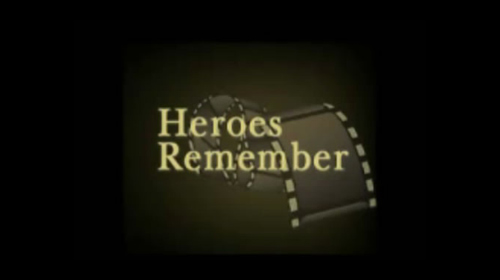The shell had torn his hip away.
First World War Audio Archive
The shell had torn his hip away.
Transcript
Soldier on a motorcycle passes a battalion marching.
of any consequence to speak of until November the 10thSingle file of Soldiers walking across a broken fence line.
when we were told that we were to go in and make an attack at midnight on Regina Trench. Two other battalions,Soldiers continue crossing hilly terrain.
the 4th Battalion and the 44th, had previously attempted toSoldiers running towards the enemy and jumping over a trench.
take this trench but were repulsed so we knew it was going to be a hard job to take. However, we went upSoldiers line up along a trench and then climbing out to begin an attack.
the line that night and got in position. At 12 o’clock, the attack on Regina Trench was on. We took the trench, alright, except a few casualties, of course. The next morning,Soldiers diving for cover while explosions go off.
Aftermath of broken trees and bare earth from fighting.
I looked around to see how many were missing and one of my pals, Lieutenant Young of ‘C’ company, I couldn’t find him anywhere so I thought, well, I guess he must have been wounded on the way over in the attack so I took a sergeant and a runner and put a white flag on a pole and got outInjured soldier being carried out by stretcher through smoke, while dead soldiers lie on the ground.
of the trench and started back to look for him. The Germans were oh, a hundred yards or so in front of us so I thought perhaps they wouldn’t shoot us if I put this white flag up. I found Lieutenant Young about half way over from a trench we’d started at on the night before. The shell had caught him right on the hip and torn his hip away and of course he was lying there dead. I knew thatInjured soldier with a bandage over his eyes being attended to by a group soldiers.
he was from Ontario and was an only son. And I thought, my, I’ll have to write and tell his mother about this and I noticed he had a signet ring on his little finger of his left hand. And I thought, I think she would like to have this. So I started to try to take it off his finger, but I couldn’t get it off. And my sergeant said, “Hold on. I'll do it for you.” So he took out his clasp knife and cut the little finger off my pal, Lieutenant Young, and gave me the ring. I wrote a letter to his mother andSoldiers paying their respects to a fallen friend, before buriel.
enclosed the ring. Of course, I never heard from her, but I only hope that she got it okay and got my letter.Description
Mr. Copp describes taking Regina Trench, including the loss of a close friend. In poignant detail he describes sending his friend’s mother a letter containing her son’s ring.
John Percy Copp
John Percy Copp was born on February 2, 1889 at Baie Verte, New Brunswick. He enlisted in the 65th Battalion at Saskatoon. Shortly thereafter, in June, 1916 he went overseas to England, training for a very short time at Camp Bramshott. On August 10, 1916 he shipped to France as a member of B Company, 46th Battalion. Mr. Copp held the rank of Lieutenant and led his men in several major actions: Ypres, the Somme, Lens and Vimy. He was awarded the Military Cross by King George V at Buckingham Palace. His story is most compelling, for in it his concern for his men is the predominant theme. At the time of his interview, Mr. Copp lived in Lajolla, California.
Meta Data
- Medium:
- Video
- Owner:
- Veterans Affairs Canada
- Duration:
- 2:43
- Person Interviewed:
- John Percy Copp
- War, Conflict or Mission:
- First World War
- Location/Theatre:
- Europe
- Battle/Campaign:
- Ypres
- Branch:
- Army
- Units/Ship:
- 46th Battalion
- Rank:
- Lieutenant
- Occupation:
- Platoon Commander
Attestation
Related Videos
- Date modified:



